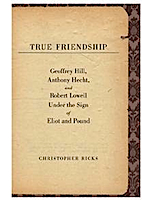By ALISON FLOOD [The Guardian] – Paula Claire, has withdrawn in protest over what she is describing as “serious flaws” in the election process that she believes have pushed best-known candidate Geoffrey Hill ahead of all other contenders.
Claire, an Oxford-based poet who hoped to “provide a comprehensive update on the hidden mass of innovative 20th-century poetic forms; show how the tradition of group speaking of poetry has been revitalised; and encourage the use of modern technology in the service of poetry” if she were elected, informed Oxford University yesterday that she would no longer be running in the election.
She is protesting over the fact that she was described as a “performer and artist” in Oxford’s announcement of the 11 candidates for the post, omitting the fact that she is a poet.
A University of Oxford spokesperson said that while the university was “disappointed” to learn of Claire’s withdrawal, it did “not accept her allegations that the election process has been unfair”. “No special arrangements have been made for this election that are inconsistent with normal university operations in this respect,” said the spokesperson. “The university published a brief line on each candidate in announcing the final list of confirmed nominees as part of a news release, and the process by which these were composed was the same for all candidates. Paula Claire expressed dissatisfaction with the wording of her description, and the description was duly changed as soon as her complaint was received.”
Ruth Padel was elected to the position of Oxford poetry professor last May, but resigned after only nine days in the post when it emerged that she had pointed out allegations of sexual harassment made against Walcott to two journalists. The position, previously held by Christopher Ricks, has subsequently been empty, with the new incumbent due to take up their role this autumn.
Continued at The Guardian | Seamus Heaney on Geoffrey Hill in The Daily Telegram | Paula Claire’s website. (There is no ‘geoffreyhill.com’, but BU does maintain a faculty profile of Hill.)
Christopher Ricks on Geoffrey Hill
 By PETER McDONALD [in a review of True Friendship: Geoffrey Hill, Anthony Hecht, and Robert Lowell Under the Sign of Eliot and Pound
By PETER McDONALD [in a review of True Friendship: Geoffrey Hill, Anthony Hecht, and Robert Lowell Under the Sign of Eliot and Pound in Tower Poetry] – The prime ingrate in this whole process – its Goneril or Regan, perhaps – is Geoffrey Hill, whose critical strictures on Eliot have become increasingly stern over the years. Ricks’s task is a delicate one here, and his long chapter on Hill is as scrupulous as it is critically brilliant, asking us to compare the kinds of creative indebtedness to Eliot exhibited in Hill’s poetry with the critical attacks made on Eliot in his prose. Undoubtedly, Ricks identifies places in Hill’s poetry where Eliot is in earshot, and for which he is an essential stimulus: the criticism comes close, in fact, to suggesting that even Hill’s more raucous recent verse, in spitting-distance of popular culture, is itself dependent on Eliot’s example. Ricks reads all creative indebtedness as a species of gratitude, so that the gratitude is there in the poetry, whatever the poet himself might like to think, or however he might address his relations with Eliot in his own prose criticism. Here, Ricks has to declare interests of his own, and honourably does so in full, explaining how Hill has included him in the number of those misled by the later Eliot’s “tone”. The defence mounted here is a spirited and intelligent one, and remains a self-defence for as short a time as possible, but it still fails quite to defuse some of Hill’s objections to the manners of Eliot’s Four Quartets verse; and even Ricks’s intense and sympathetic teasing out of the Eliot influence in Hill’s poetry does not put those objections conclusively aside.
Continued at Tower Poetry | More Chronicle & Notices.





















Post a Comment